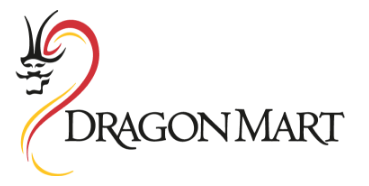How to Start an Online Business

In today's digital age, there is an abundance of online businesses to start ranging from niche apparel boutiques to subscription box services and digital product platforms.
If you're aiming to pursue your passion, break free from the limitations of a conventional job or harness the immense potential of e-commerce, the internet presents a multitude of avenues for entrepreneurial triumph. Here's how to start an e-commerce business to kickstart your journey into the world of online entrepreneurship.
Steps to Start an Online Business
-
Choosing the Right Online Business Idea
The first step in starting an online business is selecting a niche that aligns with your interests, skills and market demand. Consider your passions, hobbies and areas of expertise to identify potential business ideas. Research market trends, analyse competitors, and explore untapped opportunities to carve out your niche in the digital landscape.
-
Setting up your E-commerce Platform
Once you've settled on a business idea, it's time to establish your online presence. Choose a reliable e-commerce platform that suits your needs. There are many platforms to choose from that offer user-friendly interfaces, customisable templates, and integrated payment gateways to streamline the process of setting up your online store.
-
Building your Brand Identity
Your brand identity plays a crucial role in attracting customers and differentiating your business from competitors. Invest time and effort in creating a compelling brand name, logo, and a visual identity that resonates with your target audience. Develop a Unique Selling Proposition (USP) that highlights the value proposition of your products or services.
-
Sourcing Products
If you're launching an e-commerce business, you'll need to source products to sell on your platform. Explore various options, such as dropshipping, wholesaling or manufacturing your own products. Research suppliers, negotiate terms and ensure product quality and reliability to maintain customer satisfaction.
-
Implementing Effective Marketing Strategies
Marketing is essential for driving traffic to your online business and converting visitors into paying customers. Utilise a mix of digital marketing tactics including search engine optimisation (SEO), social media marketing, email marketing and content marketing, to increase visibility and engagement. Leverage data analytics tools to track performance metrics and optimise your marketing campaigns for maximum effectiveness.
-
Providing Exceptional Customer Service
Delivering exceptional customer service is key to building long-term relationships and fostering customer loyalty. Prioritise responsiveness, transparency and personalised communication to address customer inquiries, resolve issues promptly and exceed expectations. Implement a user-friendly website interface, secure payment processing and hassle-free returns policy to enhance the overall shopping experience.
-
Scaling Your Business
As your online business grows, focus on scaling operations and expanding your reach to new markets. Invest in automation tools, streamline processes and delegate tasks to optimise efficiency and productivity. Explore opportunities for diversification, partnerships and strategic collaborations to unlock new growth avenues and stay ahead of the competition.
E-commerce Business Ideas
Here are just a few examples of e-commerce business ideas and some products you sell online that can be tailored to suit different interests, passions, and market demands. With creativity and strategic planning, you can carve out a profitable niche within the competitive e-commerce landscape.
-
Niche Apparel and Accessories
Create an online boutique specialising in a specific clothing style, such as sustainable fashion, athleisure wear or vintage clothing.
-
Health and Wellness Products
Sell health supplements, organic skin care products or fitness equipment catering to health-conscious consumers.
-
Home Decor and Furnishings
Curate a collection of unique home decor items, furniture and accessories for interior design enthusiasts.
-
Personalised Gifts and Customised Products
Offer personalised gifts such as custom made jewellery, engraved items or monogrammed accessories for special occasions.
-
Subscription Boxes
Create subscription-based services delivering curated boxes of niche products, such as gourmet snacks, beauty samples or pet supplies.
-
Digital Products and Online Courses
Develop digital products like e-books, online courses, or software tools targeting specific niche markets, such as digital marketing tutorials or language learning resources.
-
Drop shipping Business
Start a drop shipping store by partnering with suppliers to sell a wide range of products without holding inventory, focusing on trending items like smart gadgets, fashion accessories or home goods.
-
Pet Supplies and Accessories
Cater to pet owners by selling pet supplies, grooming products and accessories for dogs, cats and other pets.
-
Eco-Friendly Products
Launch an e-commerce store specialising in eco-friendly and sustainable products, including reusable household items, biodegradable packaging and organic beauty products.
-
Kitchen Gadgets and Cooking Tools
Offer a selection of innovative kitchen gadgets, cooking tools and culinary accessories for home chefs and cooking enthusiasts.
-
Virtual Event Planning Services
With the rise of virtual events and conferences, there's a growing demand for professional event planners who specialise in coordinating online gatherings. Offer virtual event planning services, including event strategy, platform selection, speaker management, attendee engagement and technical support, to businesses and organisations looking to host successful virtual events.
What is a Wholesale Market?
A wholesale market serves as a pivotal hub within the supply chain, facilitating large-scale transactions between manufacturers, distributors and retailers. These bustling marketplaces offer a diverse array of products at competitive prices, making them essential destinations for businesses seeking to source inventory in bulk quantities. Wholesale markets typically feature a wide range of goods, ranging from consumer electronics and apparel to food products and household items.
Dragon Mart
Dragon Mart in Dubai is a good illustration of the entrepreneurial spirit and innovative thinking that drive successful Internet businesses. Its transition from a traditional market to a booming e-commerce platform demonstrates the transformative power of adopting digital technology and responding to shifting market circumstances. Dragon Mart promotes economic progress by offering a varied range of products, encouraging international trade and empowering entrepreneurs. Aspiring online business owners can be inspired by Dragon Mart's path, which emphasises the significance of market research, strategic planning and customer-centricity in developing a successful online operation.
